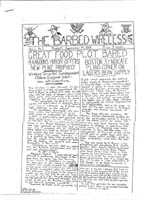Table of Contents
Appendix 14b
The Barbed-Wireless
 American prisoners at the Ukrainerlager in Rastatt, Baden published the first issue of this four-page prison camp newspaper on 14 September
1918. The German Army built this prison facility as a propaganda camp for Ukrainian prisoners of war in preparation for the post-war occupation
of the Ukraine (note the price of the newspaper is in kopeks). Conrad Hoffman, the Senior American WPA Secretary in Germany, made arrangements
with the imperial government to concentrate all of the American POWs in this camp which made it far easier for the YMCA to provide services to
American enlisted men and non-commissioned officer prisoners. The move also improved the living standards for American soldiers, since Rastatt
offered far better accommodations and conditions that Tuchel and other prison camps. Note the poor quality of The Barbed-Wireless, especially
in relation to the Camp de Göttingen and the The Wooden City (Göttingen). The American newspaper is hand-printed and mimeographed on poor
quality paper, whereas earlier British and French prison newspapers were professionally printed on better paper stock. The quality of the
American paper reflects the short supplies available in war-torn Germany by the end of 1918.
American prisoners at the Ukrainerlager in Rastatt, Baden published the first issue of this four-page prison camp newspaper on 14 September
1918. The German Army built this prison facility as a propaganda camp for Ukrainian prisoners of war in preparation for the post-war occupation
of the Ukraine (note the price of the newspaper is in kopeks). Conrad Hoffman, the Senior American WPA Secretary in Germany, made arrangements
with the imperial government to concentrate all of the American POWs in this camp which made it far easier for the YMCA to provide services to
American enlisted men and non-commissioned officer prisoners. The move also improved the living standards for American soldiers, since Rastatt
offered far better accommodations and conditions that Tuchel and other prison camps. Note the poor quality of The Barbed-Wireless, especially
in relation to the Camp de Göttingen and the The Wooden City (Göttingen). The American newspaper is hand-printed and mimeographed on poor
quality paper, whereas earlier British and French prison newspapers were professionally printed on better paper stock. The quality of the
American paper reflects the short supplies available in war-torn Germany by the end of 1918.
The Barbed-Wireless is a humorous work, designed to "...keep its readers as thoroughly misinformed as possible on all events of no importance whatsoever, the BARBED-WIRELESS has engaged on its reportial staff the most incompetent and unreliable writers in captivity." The front page features two lead stories, "Rangoon's Mayor Offers New Peace Prophecy" and "Boston Syndicate Plans Corner on Lager's Bean Supply." While the first page provides little information on life in the prison camp (outside of personal jokes between the inmates), the editors declare on page two that the "Purpose of this embryonic journal is to keep alive the spirit of Americanism, to drive away gloom and depression that might take root from time to time, and to set down in durable form a record of all events and happenings among us which may prove of interest later on when our life at Rastatt is but a dim memory..." The important influence of the YMCA is revealed on the last three pages of the newspaper. The editors express their thanks to Conrad Hoffman and Emil Diehl for their hard work in establishing an Association at Rastatt and list all of the books, games, sports equipment, and money for special cases that the YMCA had provided. In the articles on page three, the editors address sports, theatricals, a food exchange, and new Bible classes available at Rastatt. Again, the YMCA played a prominent role in terms of developing these activities. On the last page, the editors summarize the rules governing the YMCA lending library with the note that the Association planned to send more books for the prisoners, men in the lazarets, and on work commandos. The American newspaper is significantly different from English and French prisoner newspapers in content and enthusiasm.
Notes:
Note 1: The Barbed-Wireless, I:1 (14 September 1918), Rastatt, Baden. Armed Services Records Box 52, Folder: "Prisoner of War Work-General-1915-1920," Kautz Family YMCA Archives, University of Minnesota, Minneapolis, MN.